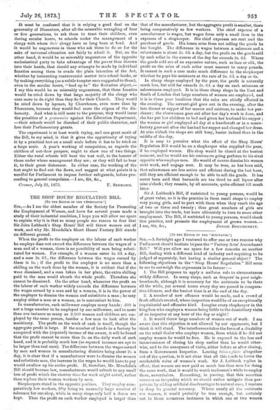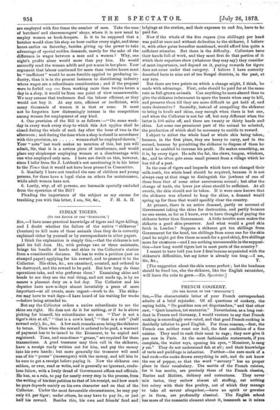[TO THE EDITOR OF THE"SPECTATOR."]
SIR,—A fortnight ago I ventured to offer one or two reasons why Parliament should hesitate to pass the " Factory Acts' Amendment Bill." Will you allow me space for a few remarks on another Bill, dealing with a different kind of industry and requiring to be judged of separately, but having a similar general object? The following objections to the "Shop Hours' Regulation" Bill seem to me to outweigh the arguments in its favour :- 1. The Bill proposes to apply a uniform rule to circumstances widely different. In many shops, such as drapers' in poor neigh- bourhoods, although it is necessary for the assistants to be there all the while, yet several hours every day are passed in compara- tive idleness, and the busiest time is at the end of the day.
2. A number of new offences would be made, and a crowd of fresh officials created, whose inspection would be of an exceptionally inquisitorial and offensive kind. Imagine every shopkeeper in the kingdom who employs a woman being liable to the domiciliary visits of an inspector at any hour of the day or night !
3. It would throw large numbers of women out of work. I am aware that this objection is not allowed by our opponents, but I think it will stand. The interference takes the form of a disability on the retail dealer who employs women, from which if he did not employ women he would be free. He is exposed to the loss and inconvenience of closing his shop earlier than he would other- wise, and to the annoyance of visits, either before or after closing, from a Government Inspector. Leaving laissez-faire altogether out of the question, is it not clear that all this tends to lessen the marketable value of women's work. Sir J. Lubbock replies in effect, that women are now paid so much less than men for doing the same work, that it would be worth tradesmen's while to employ them, nevertheless. Remarking, in passing, that this assertion assumes an inequality which we should rather mitigate than per- petuate by adding artificial disadvantages to natural ones, I venture to deny its general accuracy. Where nearly all the assistants are women, it would probably be true enough, but certainly not in those numerous instances in which one or two women are employed with five times the number of men. Take the case of butchers' and cheesemongers' shops, where it is now usual to employ women as book-keepers. Is it to be supposed that a butcher would close his shop an hour earlier every night, and three hours earlier on Saturday, besides giving up the power to take advantage of special sudden demands, merely for the sake of the difference in wages between a man and a woman ? Why, one night's profits alone would more than pay him. He would assuredly send the woman adrift and put a man in her place. Your argument that labour continued for more than twelve hours must be " inefficient" would be more forcible applied to producing in- dustry, than it is in the present instance to distributing industry where wages are a subordinate consideration ; and if the proposal were to forbid any one from working more than twelve hours a day in a shop, it would be from one point of view unanswerable. We may assume that tradesmen find the labour efficient, or they would not buy it. At any rate, efficient or inefficient, with many thousands of women it is that or none. It must not be forgotten how distressingly intense is the competition among women for employment of any kind.
4. One provision of the Bill is as follows :—" On some week- day in every week every shop to which this Act applies shall be closed during the whole of such day after the hour of two in the afternoon ; and during the time when a shop is closed in accordance
with this provision, no woman shall be employed therein." Your " note" last week makes no mention of this, but you will admit, Sir, that it is a serious piece of interference, and would place any shopkeeper employing women at a disadvantage with one who employed only men. I have not dwelt on this, however, since I infer from Sir J. Lubbock's not mentioning it in his letter to the Times that it would not have been pressed in Committee.
5. Similarly I have not touched the case of children and young persons, for these have a legal claim on others for maintenance, while adult women have not.
6. Lastly, why, of all persons, are barmaids specially excluded from the operation of the Bill ? • Pleading the importance of the subject as my excuse for troubling you with this letter, I am, Sir, &c., F. H. A. H.



































 Previous page
Previous page